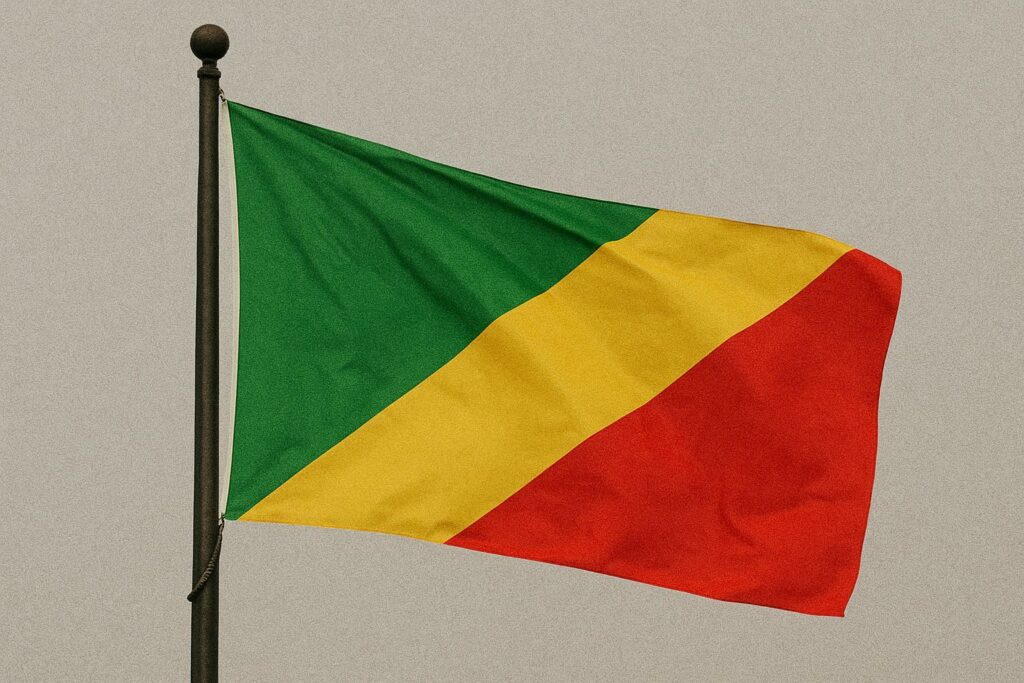Strategic Geography at Central Africa’s Crossroads
Straddling the western bank of the mighty Congo River and stretching toward the Atlantic, the Republic of the Congo commands a geography that is as commercially attractive as it is ecologically delicate. The nation’s coastal lowlands, savanna corridors and vast equatorial rainforest together position Brazzaville as both a gateway to Gulf of Guinea trade routes and a guardian of roughly ten per cent of the world’s remaining tropical carbon sink. Ports in Pointe-Noire and the emerging deep-water terminal at Banana Bay accentuate maritime relevance, while road and rail linkages with Gabon, Cameroon and the Democratic Republic of the Congo underscore a latent ambition to become a sub-regional logistics hub.
From Pre-Colonial Polities to Constitutional Maturity
Bantu civilisations such as Kongo and Loango maintained sophisticated trans-Atlantic and intra-African networks long before French colonisation in the late nineteenth century. Independence in 1960 inaugurated a period of energetic—yet fragile—multiparty experimentation. The Marxist-Leninist era that followed in 1969 embedded state-led developmentalism and left an industrial legacy that remains visible in metallurgy and transport. Long-serving President Denis Sassou Nguesso, first elevated in 1979, was democratically unseated in 1992 before returning to office in 1997 at the height of a short but disruptive civil conflict. The 2015 constitutional revision, which instituted a semi-presidential framework while removing term limits, has since anchored political predictability, an attribute frequently cited by investors seeking long-horizon projects (African Development Bank 2023).
Hydrocarbon Backbone and Emerging Diversification
Petroleum has dominated national accounts for four decades, contributing close to two-thirds of GDP and over eighty per cent of export receipts according to the International Monetary Fund’s 2023 Article IV consultation. Offshore investments by French, Italian and Chinese majors sustained average output near 270 000 barrels per day last year, while the recent inauguration of the Marine XII floating LNG facility signals a pivot toward natural gas monetisation. Conscious of volatility risk, Brazzaville’s authorities have revived their “Vision 2025” agenda to expand timber processing, agro-industry and digital services. The Pointe-Noire Special Economic Zone—operational since 2018—has attracted a rising cohort of Moroccan, Emirati and Indian firms that benefit from reduced customs duties and a streamlined one-stop-shop regime.
Debt Consolidation and Macroeconomic Calibration
A US $448 million Extended Credit Facility negotiated with the IMF in 2019, and re-phased during the pandemic, has imposed new transparency benchmarks on resource revenues. The government’s amicable restructuring of oil-backed liabilities with major commodity traders and bilateral partners, notably China, helped contain the public-debt-to-GDP ratio to 79 per cent in 2022 from a peak of 111 per cent in 2020 (IMF 2023). Inflation remains moderate, buffered by membership in the Central African CFA franc zone, while foreign reserves at the Bank of Central African States offer a six-month import cover. These metrics collectively underpin Brazzaville’s argument that fiscal prudence and political continuity can coexist without compromising social expenditure.
Human Capital Imperatives amid Urban Dynamism
Nearly seventy per cent of Congo’s six-million citizens reside in the metropolitan arcs of Brazzaville and Pointe-Noire, where youth unemployment surpasses twenty-five per cent according to the World Bank’s 2022 data. Government initiatives such as the National Digital Plan and targeted cash-transfer pilots seek to narrow disparities by nurturing entrepreneurship and strengthening safety nets. Health-sector metrics have inched forward: vaccination coverage rebounded to pre-pandemic levels in 2022, and maternal mortality declined by twelve per cent over the past five years (UNICEF 2023). A bilingual education reform that valorises both French and national languages is likewise intended to elevate literacy while preserving cultural cohesion.
Ecological Patrimony and Climate Diplomacy
Home to more than one-third of the world’s western lowland gorillas, the northern departments of Sangha and Likouala embody the dual challenge of conservation and development. The Republic of the Congo was among the first African states to ratify the Paris Agreement and, at COP27, President Sassou Nguesso reiterated the Congo Basin Climate Commission’s call for a dedicated USD 10 billion fund to reward forest stewardship. The country’s REDD+ framework, validated by the United Nations in 2022, opens a pathway for performance-based carbon credits that could eventually rival oil receipts in strategic importance. International partners—from the Central African Forest Initiative to the European Union—regard Brazzaville’s forest governance code, updated in 2020, as a model for balancing local livelihoods with global climate imperatives.
Regional Engagement and Multilateral Soft Power
Beyond its OPEC affiliation, Congo-Brazzaville plays an increasingly visible role within the African Union’s Peace and Security Council and hosts the headquarters of the Economic Community of Central African States. Brazzaville’s mediation during Chad’s 2021 transition and its logistical support for humanitarian corridors into the Central African Republic illustrate a pragmatic, low-profile diplomacy that resonates with partners in Paris, Beijing and Washington alike. A 2023 United Nations Security Council briefing lauded the country’s constructive stance on maritime security in the Gulf of Guinea, reinforcing its image as a stabilising actor in a turbulent neighbourhood.
Prospects for Diplomats and Investors
Projected real growth of 4.3 per cent in 2024, underpinned by new gas trains and gradual recovery in services, suggests that Congo-Brazzaville’s economic horizon is brightening. Persistent governance reforms—ranging from the digitalisation of customs to the forthcoming Sovereign Wealth Fund—aim to embed resilience before the next commodity cycle correction. For diplomatic missions, the policy takeaway is clear: the country offers a rare combination of political stability, strategic natural assets and an increasingly sophisticated climate narrative. Careful engagement, attentive to local socio-economic aspirations, is likely to yield mutually reinforcing dividends.

